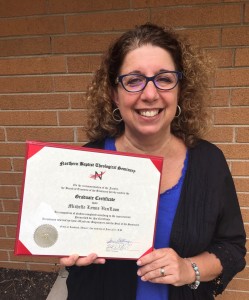This Sunday is Father’s Day. For some of us, the day will be a sentimental one filled with the gifts of a construction paper card with a crayoned sentiment and a medium-rare steak on the grill. For others, the word “Father” is tied to abuse, neglect or abandonment, and June 15th will be just another day of painful memories.
My friend Libby Buchanan, a survivor of the child pornography industry, has earned a spot in the latter category, but has worked hard to both integrate and move beyond her experiences. Libby sent me some thoughts about how it is possible to honor parents who have behaved, to put it mildly, in a dishonorable manner. I’m sharing a bit of her hard-won wisdom (below the picture) with you today – and am interested in your feedback about her words.
To learn more about Libby’s writing and teaching ministry, click here.
Honoring The Dishonorable?
Exodus 20:12. Right there in the Big Ten.
(Sigh)
God made it number five, right in the middle so we wouldn’t miss it. I’ll save you the look up:
Honor your father and mother, that your days may be prolonged in the land which the Lord your God gives you.
So what do you think? Maybe God doesn’t know about yours or my parents? Because if He did, He surely would have added a caveat. Something that starts with “unless…”
Really, how does one honor parents who are not honorable people?
Only a direct command from the Almighty Himself could slow me down enough to even consider the idea. Having been betrayed into the child pornography industry by my mother and all but abandoned by my father, I was pretty sure there had to be exceptions. And I did check; hey, hope springs eternal. Turns out the fifth commandment is not a suggestion, proposal or proposition. Exodus 20:12 is in the imperative tense; I suppose that’s why it’s called a commandment.
So I looked up “honor” and found Webster’s definition intriguing. It’s defined as “a manifestation of respect”; a “distinguished position.” The definition ends by stating, “honor” is a “ceremonial sign of consideration.”
I wanted to do what was best, but let’s be real, even something as simple as sending a card chafed at me. Maybe you are fighting the idea of honoring your parents, too. You may want to do what is “right” but it may feel like a betrayal to your own story. That you’d be “giving in to them” one more time and you’d lose self respect if you did. They might misunderstand you (yet again) and think everything is okay between you two. You might think that the whole subject of honoring parents is just too messy. It’s filled either with landmines that will blow you up or quagmires that will drag you down.
I get it. So I broke down the verse and the word definitions in terms of God’s vision rather than Hallmark’s…or Webster’s.
Webster’s said honor is a manifestation of respect. How did God want me to respect people who’d done the unthinkable to me? To be clear: I am not talking about having a high opinion or having to show admiration for people who have not earned it. I am not talking about holding them in esteem or looking up to parents who have used and abused us. Part of respect, though, is to show consideration; to appreciate the positive. I am “manifesting respect” when I recognize and salute any good that comes out of the relationship.
This takes a willful change of focus. When it came to hashing and rehashing my childhood war stories, I had to change the focus from the negative to the positive. Tearing down my parents and shredding their reputations did not serve God. Doing so did not serve me well either. Since parents—mine included—are not monsters all the time, I began simply. “Hey, did I ever tell you about the time my mother/father…” and filled in the blank with a truthfully good thing. And there were more than I thought.
Since the beginning of days, and until relatively recently in America, it was the parents’ role to teach their children to survive. Regardless of gender, everyone was taught the rudiments of hunting, gathering and cooking. Parents modeled how to get along in society, and introduced children to a trade or skill that would bring success to the children, and contribute to the welfare of the entire community. The position, role, or “office” of parent carries with it a measure of respect.
Theoretically, the respect for the “office” of parent should translate to the specific parents we’ve been given. What happens to respect when our parents have not treated us with the same?
When my kids were in school, they would eventually get a teacher they didn’t like or respect. It might have been a clash of personalities or a coach who looked the other way when kids picked on each other. Many of us have known public officials we didn’t like or trust. Perhaps a certain president has set our teeth on edge. Still, the office of any of those positions—teacher, coach, public official—commands my respect. Unfortunately, just like a school tends to take on the personality of the principal, or a government tends to be affected by the personality of the one in charge, it can seem like the office has some kind of a moral character of its own. In reality, though, the office or position is neutral. Understanding that truth has been a key as I’ve sought to honor my parents through the years.
Respecting certain people can just be too hard to do. I’ve learned that respecting their office gives me a way to honor those who’ve dishonored the office with which God entrusted them. I found that by respecting the office of parenthood, I could honor God by injecting a measure of honor into my communication with those who’d dishonored me.
©2014 Libby Buchanan
What do you think about this? Is it possible to respect the “office” your parent has held in your life, even if they’ve dishonored the sacred responsibility that was a part of that office’s job description? I’d love to hear your thoughts!











